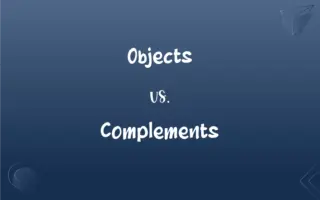Ion vs. Isotope: What's the Difference?
Edited by Aimie Carlson || By Janet White || Published on February 15, 2024
Ion is an atom or molecule with a net electric charge due to the loss or gain of electrons. Isotope refers to variants of a chemical element that have different numbers of neutrons but the same number of protons.

Key Differences
An ion is formed when an atom or molecule gains or loses electrons, resulting in a net positive or negative charge. An isotope is a form of a chemical element that has the same number of protons but a different number of neutrons in its nucleus.
Ions are important in various chemical processes, such as forming ionic bonds and conducting electricity in solutions. Isotopes of an element have the same chemical properties but can differ in physical properties like melting point and density.
The creation of an ion involves a change in the electronic structure of the atom or molecule. In contrast, the formation of an isotope involves a change in the atomic nucleus, affecting the atomic mass.
Ions are crucial in fields like electrochemistry and are widely used in batteries and electrolysis. Isotopes have applications in areas like nuclear medicine, radiometric dating, and nuclear power.
The behavior of an ion is largely dictated by its charge, which affects its reactivity and interaction with other charged particles. The behavior of an isotope is influenced by its nuclear composition, which can affect its stability and radioactive properties.
ADVERTISEMENT
Comparison Chart
Definition
Atom/molecule with a net electric charge
Variant of an element with different neutrons
Formation
Gain or loss of electrons
Change in the number of neutrons
Chemical Properties
Altered due to charge
Remains the same as the element
Physical Properties
Charge affects reactivity and interaction
Varies in stability and radioactivity
Applications
Electrochemistry, batteries
Nuclear medicine, radiometric dating
ADVERTISEMENT
Ion and Isotope Definitions
Ion
Ionic Bond Component.
Ions form ionic bonds in salt.
Isotope
Same Element Variant.
Isotopes of hydrogen include deuterium and tritium.
Ion
Electron Loss/Gain.
Gaining electrons forms a negative ion.
Isotope
Neutron Variation.
Carbon-14 is an isotope with more neutrons than Carbon-12.
Ion
Electrically Charged Particle.
Ions are essential in conducting electricity in solutions.
Isotope
Stable and Radioactive Forms.
Some isotopes are stable, while others are radioactive.
Ion
Chemical Reactivity Factor.
The reactivity of an ion depends on its charge.
Isotope
Nuclear Medicine Tool.
Radioactive isotopes are used in cancer treatment.
Ion
Charged Atom.
A sodium ion carries a positive charge.
Isotope
Atomic Mass Difference.
Different isotopes of an element have varying atomic masses.
Ion
An atom or a group of atoms that has acquired a net electric charge by gaining or losing one or more electrons.
Isotope
One of two or more atoms having the same atomic number but different mass numbers.
Isotope
(nuclear physics) Any of two or more forms of an element where the atoms have the same number of protons, but a different number of neutrons within their nuclei. Thus, isotopes have the same atomic number but a different mass number.
Isotope
To define or demonstrate an isotopy of (one map with another).
Isotope
One of two or more atoms with the same atomic number but with different numbers of neutrons
FAQs
What is an ion?
An atom or molecule with a net electric charge due to electron loss or gain.
How are ions formed?
By gaining or losing electrons.
Do ions have the same chemical properties as their neutral counterparts?
No, gaining or losing electrons alters their chemical properties.
How are isotopes formed?
Naturally, as variants of elements with different neutron counts.
What is an isotope?
A variant of a chemical element with a different number of neutrons.
How does the charge of an ion affect its behavior?
The charge determines its reactivity and interaction with other charged particles.
What is a negative ion called?
An anion.
Do isotopes have the same chemical properties?
Yes, they generally have the same chemical properties as the base element.
Can an ion be neutral?
No, ions are by definition charged.
What role do ions play in the body?
They are essential for nerve signaling and muscle function.
Can isotopes be used to determine the age of artifacts?
Yes, through radiometric dating techniques.
Are all isotopes radioactive?
No, some isotopes are stable, while others are radioactive.
What are common uses of isotopes?
In nuclear medicine, radiometric dating, and nuclear reactors.
Is the formation of an ion a chemical change?
Yes, it involves a change in the electron configuration.
What is a positive ion called?
A cation.
How do isotopes affect atomic mass?
Different isotopes contribute to the average atomic mass of an element.
Is creating an isotope a nuclear reaction?
Changing an element into an isotope can involve nuclear reactions.
Why are some isotopes unstable?
Due to an imbalance in the number of protons and neutrons in the nucleus.
Are ions always single atoms?
No, they can also be groups of atoms (polyatomic ions).
Can the number of neutrons in isotopes vary greatly?
Yes, isotopes of an element can have widely varying numbers of neutrons.
About Author
Written by
Janet WhiteJanet White has been an esteemed writer and blogger for Difference Wiki. Holding a Master's degree in Science and Medical Journalism from the prestigious Boston University, she has consistently demonstrated her expertise and passion for her field. When she's not immersed in her work, Janet relishes her time exercising, delving into a good book, and cherishing moments with friends and family.
Edited by
Aimie CarlsonAimie Carlson, holding a master's degree in English literature, is a fervent English language enthusiast. She lends her writing talents to Difference Wiki, a prominent website that specializes in comparisons, offering readers insightful analyses that both captivate and inform.







































































